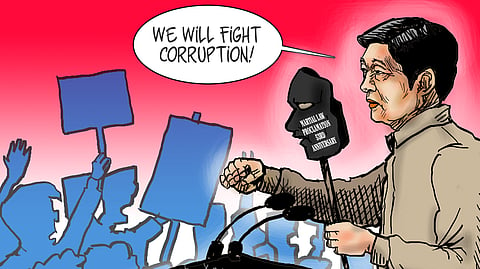
- NEWS
- the EDIT
- COMMENTARY
- BUSINESS
- LIFE
- SHOW
- ACTION
- GLOBAL GOALS
- SNAPS
- DYARYO TIRADA
- MORE

On Monday, President Ferdinand Marcos Jr. told media that if he were not in office, he would be joining the two anti-corruption demonstrations slated for Sunday, 21 September.
That day happens to mark the 53rd anniversary of his father’s, the late President and dictator Marcos Sr., proclamation putting the entire Philippines under the grip of martial rule.
The infamous Marcos martial law years, of course, will be remembered by Filipinos and the international community for the rampant corruption and human rights abuses committed by the administration then. And you would be right to feel some discomfiture when you hear what now comes out of the President’s mouth against the memory of the abuses committed during his father’s martial law regime.
The President may have assumed a principled stance against corruption but anyone looking at his family’s longstanding reputation for corruption — backed by historical records — can’t be blamed for being skeptical about his pronouncements.
This skepticism raises an important issue: can Marcos Jr. truly be trusted when he publicly condemns corruption while his family’s legacy is intertwined with serious allegations of misappropriation and abuse?
There is no doubt about the Marcos family’s historical association with corruption. His father ruled the Philippines for over two decades during which time his regime was accused of being the most corrupt. Post-martial law, numerous cases were filed against the Marcos family for the plunder of public funds, and efforts to recover the ill-gotten wealth continue to this day.
After the fall of the Marcos dictatorship in 1986, the family’s image remains controversial. Supporters often cite the infrastructure projects and economic growth during his regime, even as critics highlight the massive theft, oppressive rule and human rights violations.
How, then, does one reconcile Marcos Jr.’s condemnation of corruption and promises of reform with the family’s notorious history of abuse?
First, it raises questions about the sincerity of his anti-corruption rhetoric. Is this merely political posturing aimed at gaining support from the reformist sector? Is it an attempt to distance himself from his family’s past in the hopes of framing himself as a reform-minded leader?
Second, some argue that Marcos Jr. may genuinely be in earnest seeking change but is hamstrung by that unfortunate aspect of his family’s legacy.
To break free of the Marcos image of the past is a monumental task requiring more than just words — it demands concrete actions and structural reforms.
For many Filipinos, the family’s past serves as a lens through which the President’s integrity, regardless of his current statements, can be assessed.
Reconciling Marcos Jr.’s denunciation of corruption with his family’s past is a challenge rooted in the broader issue of political accountability and historical legacy. It involves several factors such as transparency and accountability.
Many were struck by his denunciation of corruption in flood control projects, particularly in his last State of the Nation Address. “Mahiya naman kayo sa inyong kapwa Pilipino!” he thundered, to the hearty applause of those in the halls of the Batasan Pambansa, many of whom should indeed be ashamed of their involvement in ghost and substandard flood control projects.
He ordered the immediate implementation of comprehensive audit and transparency measures, and called for legal action against those who misused public funds.
He has formed the Independent Commission for Infrastructure, naming retired Supreme Court associate justice Andres Reyes Jr. as head, former Public Works and Highways secretary Rogelio “Babes” Singson and country managing partner of Ernst & Young member firm Sycip Gorres Velayo Rossana Fajardo as members, and Baguio City Mayor Benjamin Magalong as adviser and investigator.
He has promised not to interfere with the Commission which he has mandated to probe the multibillion-peso anomaly-ridden flood control projects and name the guilty parties even if this would involve individuals affiliated with or related to him, including his own cousin, House Speaker Martin Romualdez.
There is no turning back on his words. He must now be resolute in strengthening the anti-corruption agencies and ensuring the independence of the Commission in unmasking the guilty and prosecuting them. This is essential to dispel any doubts arising from the historical perception that continues to taint his family’s image.
Thus, Marcos Jr.’s credibility is dependent on his ability to translate words into concrete action.
This must be underscored: the paradox of President Marcos’s denunciation of corruption despite his family’s notorious history is a defining dilemma.
His words may be sincere, but lasting trust in his anti-corruption stance will depend on concrete actions that challenge and, he should hope, would dismantle the entrenched legacy of his family’s tainted name.
Only through transparent reforms, accountability and a consistent commitment to integrity can the President hope to reconcile his words with his family’s past and, ultimately, genuinely earn the trust of the Filipino people.
